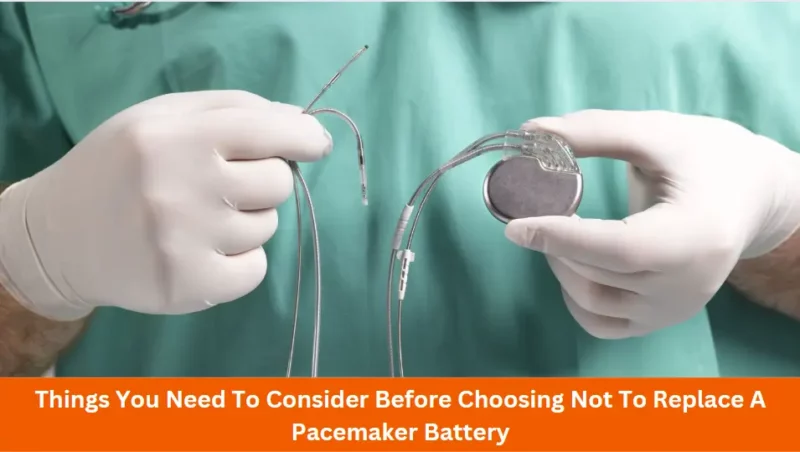Topic: “Things You Need To Consider Before Choosing Not To Replace A Pacemaker Battery“
Are you also looking for whether the pacemaker battery drains out or not?
Yes, the pacemaker batteries also drain out, just like other batteries. You have to make a doctor’s appointment to replace your battery. You can also think about how you would know when to recharge your battery. In this guide, we have answered all the possible questions in your mind. Some people even don’t want to replace their batteries; we have mentioned the ways even for those. Stay tuned, and let’s begin the guide !!
Table of Contents
How Does A Pacemaker Work?
Some people have irregular heartbeats or heartbeats at a very slow pace. It might be the symptoms of lightheadedness, fainting or palpitations. It can cause deadly reasons for anyone. Thus, Pacemakers come under CRT (Cardiac Resynchronization Therapy), which helps to maintain the rhythm of your heart.
A pacemaker is a sophisticated and small computer composed of software for electronic components, devices, and batteries. A pacemaker looks like a fifty-cent coin with 3X of its thickness. All the computer systems are attached inside the small metallic container.
Pacemakers are implanted under the collarbone skin. It has insulated wires connected to the veins in the cardiac chambers. Your lungs could also be punctured during the implantation process due to the veins near your lungs. When the pacemaker gets properly implanted, it observes the heart rhythm. If it finds any slow or erratic heart rate, it sends electrical impulses to the heart.
Why Are Pacemakers Replaced?
The human body impacts pacemakers. Our body inside is not electronic machine friendly and exposes them to the warmth and fluids present in the body. It directly damages electronic devices. Thus, pacemakers are made hermetically sealed so that pacemakers can be durable and effective in a moisturized environment.
Since it is a sealed device, you can not remove the battery. You have to replace the entire pacemaker if needed. Considering all the factors, a pacemaker generally has a lifespan of 5-10 years. Moreover, pacemakers are made under high standards, with a general failure of less than 1% after five years.
How Can You Monitor The Battery?
Once a pacemaker is implanted in the body, you have to make regular healthcare appointments. Pacemakers are electronic devices connected to the mobile phone & internet. That’s how your doctor can always monitor your pacemaker and find out before your battery completely drains. Therefore, it allows your doctor to schedule your appointments and operations based on the monitoring before any emergency occurs.
Simple Signs That Your Pacemaker Battery Is Running Out…
A low-running pacemaker battery can malfunction or even fail. Simply put, your pacemaker won’t be able to maintain your heart’s rhythm. It has several heart condition-related symptoms, including the following:
- You could lose consciousness or faint spells.
- You might face trouble breathing.
- You might have pain in the chest.
- You might feel dizzy.
- Nausea and Vomiting are the common symptoms.
- You might face heart palpitation or feel a slower heart rate than normal.
- You might face muscle twitching in the chest and abdomen.
- You might also have constant hiccups.
What Happens When a Pacemaker’s Battery Needs Replacement?
Replacing the peacemaker’s battery requires changing the whole device through surgery. Though, the pacemaker replacement surgery is way more elementary than it was primarily installed. A surgeon gently pulls out the metal box comprising the battery, computer, and electrical circuits. Surgeons also check out the entire lead connection; they are generally well-conditioned.
However, they must only replace the lead connection if it is in bad condition. It is a complex operation where surgeons have to enter the chest cavity. Therefore, if the leads are not required to be replaced, it can easily be done utilizing a small incision under local anesthesia. It is an outpatient procedure that doesn’t take more than 2 hours. The patient starts recovering within a week and gets normal within a month.
Can You Choose Not To Replace Your Pacemaker Battery?
You have an absolute right to refuse your pacemaker battery replacement medical treatment. You can refuse the treatment even if it is a life-sustaining treatment. Simply put, you can always decline your battery replacement operation.
Know This Before Taking Any Decision Regarding Your Pacemaker Battery Replacement…
If you don’t want to replace your pacemaker battery, you should know the certain implications. Generally, you don’t die if you don’t get your pacemaker battery replaced. But, it will surely make your life with various discomforts. For instance, you will face breath, fatigue, nausea, and anxiety. You should take your battery replacement seriously if you depend on your pacemaker. Otherwise, you would face heart failure, cardiac arrest, or sudden death.
Consult With Your Doctor…
Before deciding not to replace your pacemaker’s battery, you must talk to your health professional or cardiologist. Generally, your doctors would like to know your reasons for not having a battery replacement. Moreover, they would also like to convince you of the battery replacement. They would tell you about needing a pacemaker for issues like bradycardia or a slower heart rate. Simply put, a doctor will help you ensure your decision with the required facts and information.
Can You Recharge The Pacemaker Battery?
Back in the 19650’s, pacemakers were made of rechargeable nickel-cadmium material. But, the idea didn’t work out, as the batteries must be recharged every few days, and the recharging process takes several hours. It became very hectic for the patients to appoint the recharging schedule regularly.
Thus, mercury-zinc-based batteries replace nickel-cadmium batteries with the ability to keep the batteries lasting for years. Later, lithium-iodide batteries came up with the power to sustain the batteries for 5-10 years. Thus, this phenomenon has kicked off the idea of rechargeable pacemaker batteries.
To Wrap Up
Pacemakers are compact devices implanted under the human body. It is connected to your blood circulation system. It helps send the electrical impulse to maintain the heart’s rhythm. The pacemaker works on a battery that must be changed every 5-10 years. Some people decide not to change their pacemaker’s battery. It would help if you talked to your doctor before making any such decision. They will present certain facts and data to help you make the right decision. We have also mentioned certain things you should consider before making up your mind.






